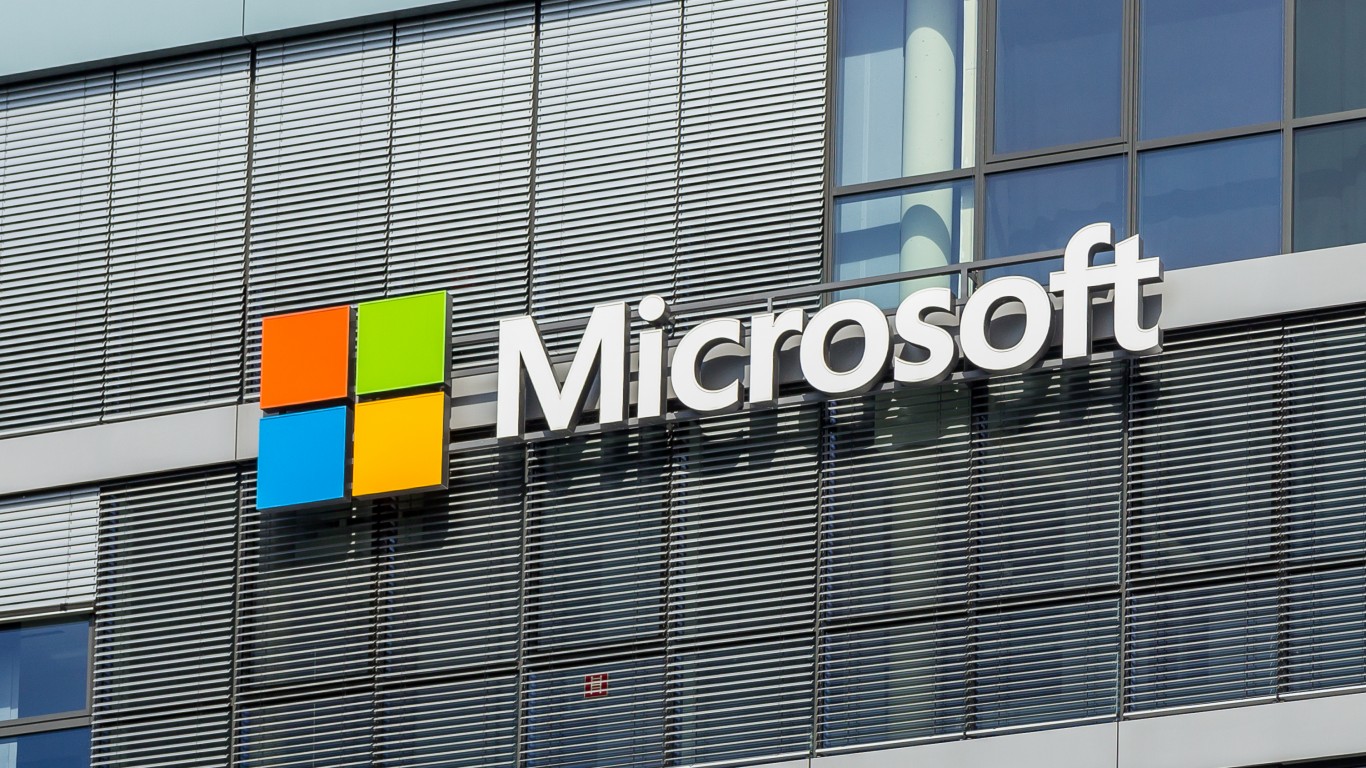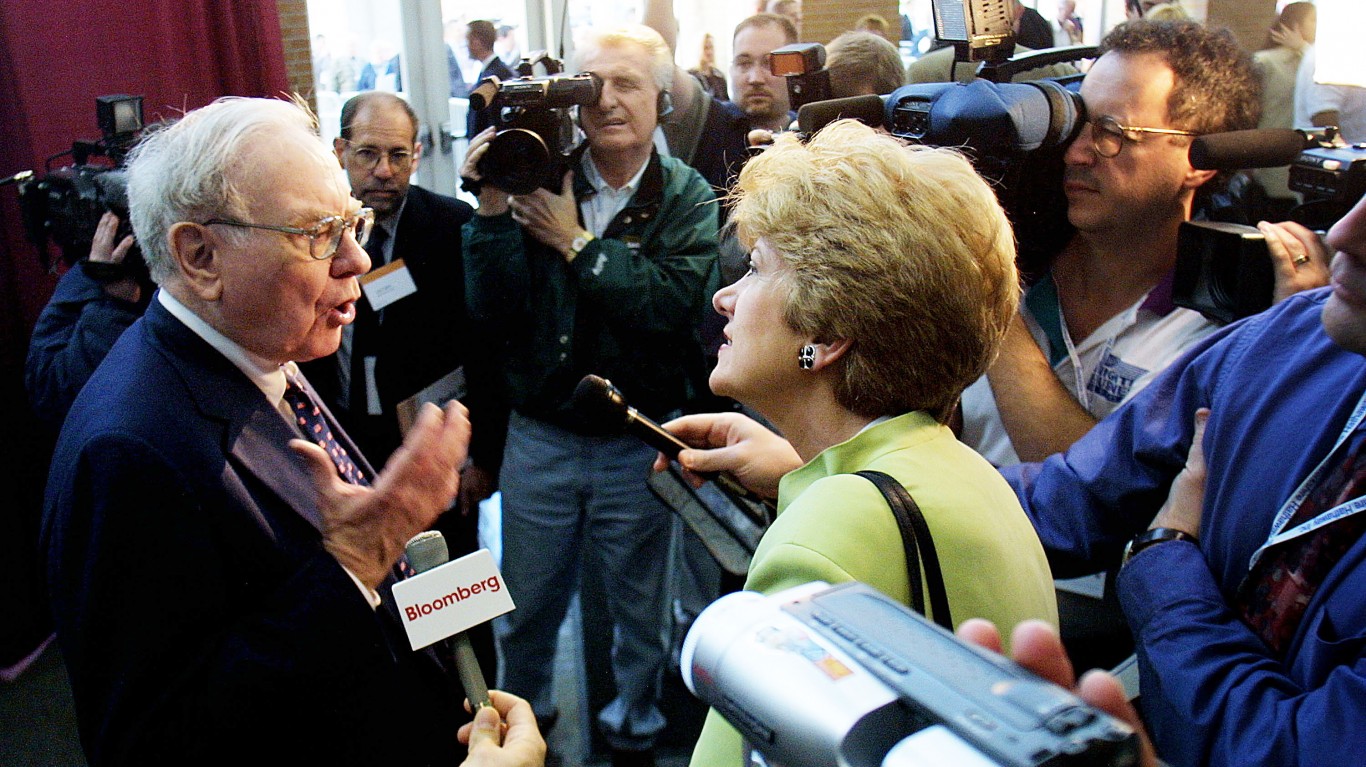
It takes a certain kind of courage to short sell blue chips, such as the Dow Jones industrial average components. Short sellers are betting on these companies to fail, or at least for their share prices to fall handily. Plus, those sellers are responsible for paying the dividends on the stocks they short.
Maybe it is little surprise that only two of the 30 Dow stocks had sizable short interest between September 30 and October 15; that is, more than 50 million shares short. In fact, just five of them had short interest of more than 40 million shares.
While the bull market is quite long in the tooth — now well more than 10 years old — and concern about a possible recession remains as the trade war with China shambles on, the markets are again trading near all-time highs. Investors may wonder then what the short sellers expect from some of the biggest, most well-respected names on Wall Street as the final quarter of the year gets underway.
As of the mid-October settlement date, the most recently reported period, short sellers favored Microsoft Corp. (NASDAQ: MSFT), Intel Corp. (NASDAQ: INTC) and Pfizer Inc. (NYSE: PFE) above all other Dow stocks.
Microsoft
> Shares short: almost 57.15 million
> Change from prior period: 7.8%
> Percentage of float: 0.8
Microsoft’s short interest has grown in eight of the past 10 periods, and it remained king of the hill among Dow stocks as the fourth quarter kicked off. The days to cover figure remained more two even though the average daily volume decreased early this month.
Microsoft recently offered up a dividend hike too large to ignore. The share price rose about 2% in the first two weeks of this month, closely tracking the Nasdaq in that time. Note that they were down more than 3% earlier in the period, and they retreated again after the settlement date.
After ending the past week essentially flat, Microsoft stock closed trading most recently at $139.94 a share. That was in a 52-week range of $93.96 (seen last December) to $142.37 (last month). The most recent share price is around 36% higher than at the beginning of the year, compared to a 7% or so gain for the Dow.
Intel
> Shares short: almost 55.55 million
> Change from prior period: 10.4%
> Percentage of float: 1.3
Intel short interest continues to rebound from a year-to-date low in September but is still well below the year-to-date high of more than 63 million shares back in July. At the average daily trading volume on the latest settlement date, it would take these investors more than three days to cover their short bets.
Intel remains a common top holding in ESG (environmental, social and governance) funds. Short sellers watched the shares pull back more than 5% but then recover and end the two weeks with a gain of more than 2%. Note that the S&P 500 ended those two weeks only a fractionally higher.
Intel was last seen trading at $52.23 a share, down from the multiyear high of $59.59 seen this past spring and nearer the 52-week low of $42.36. The latest share price is more than 7% higher than at the beginning of the year, but the Nasdaq is up almost 13% year to date and the Dow has seen that gain of about 7%.
Pfizer
> Shares short: about 49.04 million
> Change from prior period: 2.5%
> Percentage of float: 0.9
After topping the Dow short interest list in most periods since May, Pfizer dropped a couple notches in the final weeks of the third quarter. The most recent days to cover figure is more than two. And note that the latest number of shares short is nowhere near the 156 million seen back in January.
While Pfizer has lagged the Dow this year, some see it as a solid defensive pick for the fourth quarter and beyond. Its shares ended the first two weeks of this month less than 2% higher than where they started, despite being down almost 4% earlier in the period. Meanwhile, the Dow had risen nearly 2% by the mid-month settlement date.
Shares closed most recently at $36.39 apiece, which is down fractionally in the past week. Pfizer’s 52-week low of $33.97 was seen in August, and the 52-week high of $46.47 was from last December. The stock now trades around 14% lower than at the beginning of the year.
And the Rest
Rounding out the top five most shorted Dow stocks on the most recent settlement date were Apple Inc. (NASDAQ: AAPL) and Exxon Mobil Corp. (NYSE: XOM). Only the former saw growth in the number of its shares short during the first two weeks of October. The share price of Apple rose during the period too, more than 4%, and speculation increased that it might buy Netflix to step up its game in video streaming. On the other hand, Exxon retreated about 2% during those two weeks. Some analysts still consider it and its peers to be good bets for 2020.
Also notice on the following list of short interest changes in Dow stocks as of October 15 the double-digit swings at Dow (volatility), Goldman Sachs (earnings miss) and United Health (downgrades, political concerns).
| Dow Stock | Short (millions) | Change | % Float |
|---|---|---|---|
| Microsoft | 57.15 | 7.75% | 0.75% |
| Intel | 55.55 | 10.40% | 1.25% |
| Pfizer | 49.04 | 2.53% | 0.89% |
| Apple | 48.02 | 9.31% | 1.06% |
| Exxon | 40.28 | −2.75% | 0.95% |
| Verizon | 36.17 | −3.98% | 0.87% |
| Coca-Cola | 35.32 | 2.95% | 0.83% |
| Cisco | 33.93 | −6.90% | 0.80% |
| Visa | 31.51 | 8.87% | 1.83% |
| Walgreens | 27.99 | 4.11% | 3.71% |
| JPMorgan | 27.29 | −0.95% | 0.86% |
| Procter & Gamble | 22.24 | −5.02% | 0.89% |
| Merck | 21.44 | −0.14% | 0.84% |
| Chevron | 20.36 | −5.53% | 1.07% |
| Disney | 17.88 | 0.14% | 0.99% |
| Walmart | 17.09 | −3.52% | 1.21% |
| Johnson & Johnson | 16.72 | 0.32% | 0.62% |
| IBM | 16.05 | 5.81% | 1.81% |
| Home Depot | 12.07 | −1.76% | 1.10% |
| UnitedHealth | 9.83 | 16.59% | 1.04% |
| 3M | 9.49 | −1.26% | 1.65% |
| Caterpillar | 9.26 | 3.59% | 1.65% |
| Nike | 8.97 | −2.81% | 0.74% |
| Dow | 8.95 | −17.43% | 1.16% |
| Goldman Sachs | 7.72 | 17.26% | 2.27% |
| McDonald’s | 6.58 | −4.07% | 0.87% |
| American Express | 6.33 | −5.59% | 0.78% |
| United Technologies | 6.62 | 4.09% | 0.77% |
| Boeing | 5.40 | −7.19% | 0.96% |
| Travelers | 3.61 | −0.71% | 1.41% |
Thank you for reading! Have some feedback for us?
Contact the 24/7 Wall St. editorial team.





